Jun 16, 2021
“In its six-part podcast series, Remember Who Made Them delves into conversations with fashion advocates, philanthropists, social justice workers and sustainability experts. Some of the organizations featured in the series include Remake World, the #PayUp campaign, the Solidarity Center and Business and Human Rights Resource Center.”
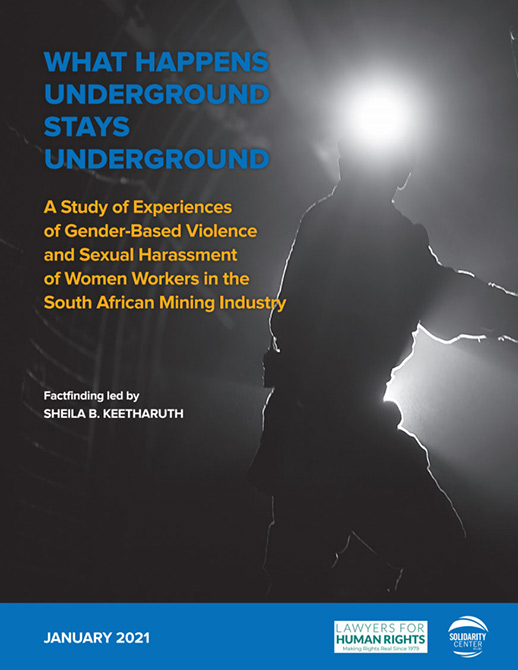
Apr 28, 2021
Women working in South Africa’s mining sector report being subject to sexual and gender-based violence and harassment, inside mines and within the mining communities where they live and efforts to redress such abuse must address the nature of the workplace and political, social and economic factors.
Download here.
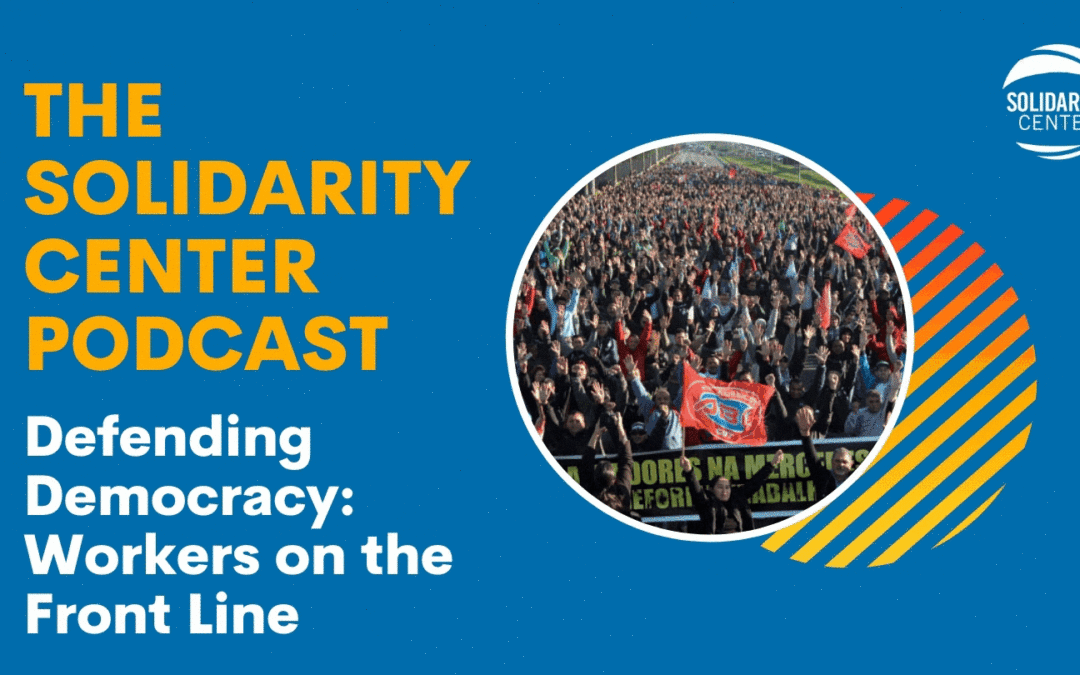
Mar 19, 2021
Democracy is under siege around the world with the subversion of democratic processes and outright coups—and attacks worker rights are a big part of authoritarian efforts to cut off civil liberties.
On this week’s Solidarity Center Podcast, two worker advocates from countries where democracy is under threat—Belarus and Brazil—discuss how workers are pushing back against repression and are building a better future for their countries, one that recognizes worker rights are a foundation of true democracy.
Maximilano Garcez, president of the Brazilian Association of Union Lawyers, represented families of the 272 people who died in a preventable mining disaster in 2019. The Brumadinho mining waste dam, held by walls of sand, collapsed during rainy season cutting a path of destruction from the mine and for miles into the surrounding community. It is among nearly 100 mining dams in the country built the same way.
The mining disaster was “industrial homicide”—the result of corporations “incentivized to greed” in a system where “killing people has been worthwhile,” says Garcez.
Workers Rise Up in Belarus Against Repressive Regime
Also on the show, Sergey Antusevich, vice president of the Belarusian Congress of Democratic Trade Unions, describes the recent uprising against the country’s repressive regime in which workers, led in many cases by women, have taken a key role.
“Many factories began to express a position actively, protest against violence and fraud, and started for the first time in Belarus history to set up strike committees” despite a strike ban, he says.
“At the same time, the protesters made demands: resignation of Lukashenko and his clique and an end to violence and repression and holding fair elections. At the same time, workers and employers began to quit the state trade unions and tried to create independent trade unions.”
The Solidarity Center Podcast, “Billions of Us, One Just Future,” highlights conversations with workers (and other smart people) worldwide shaping the workplace for the better.
Join us for a new episode each Wednesday at iTunes, Spotify, Amazon, Stitcher or wherever you listen to your podcasts.
Solidarity Center Podcast Schedule
- March 24: Preeda, a migrant worker rights activist in Thailand working with unions to help migrant workers meet the challenges of COVID-19.
- April 7: Francia Blanco, a domestic worker and trans rights activist reaching marginalized workers through her all-trans domestic workers union.
- April 14: Adriana Paz, an advocate with the International Domestic Workers Federation who understands firsthand the power of unions in ensuring domestic workers have safe, decent jobs.
- April 21: International Trade Union Confederation President Ayuba Wabba, who explores the Nigerian labor movement’s response to the COVID crisis on workers and discusses the global labor movement’s plans to build back better for workers around the world.
This podcast was made possible by the generous support of the American people through the U.S. Agency for International Development (USAID) under Cooperative Agreement No.AID-OAA-L-16-00001 and the opinions expressed herein are those of the participant(s) and do not necessarily reflect the views of USAID/USG.
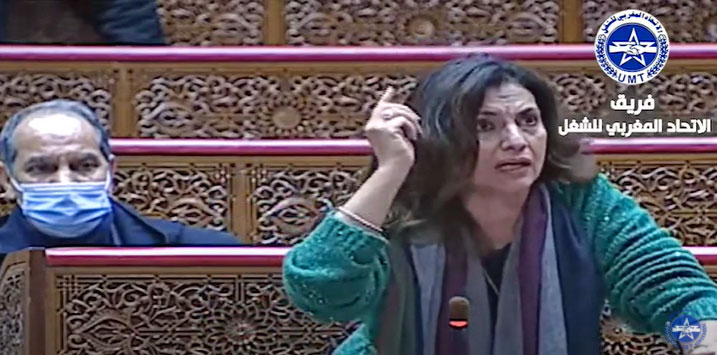
Feb 11, 2021
A 14-year old girl was among the 28 garment workers killed in a factory disaster in Tangier, Morocco, this week. Her mother says she had worked at the factory, an illegal sweatshop, for three years.
The workers were drowned or electrocuted after a flood caused a short circuit. Seventeen others were injured. The facility operated in an underground garage in a residential area with 130 workers, most of them women. A nearby resident rescued some of the workers by throwing a rope into the flooded factory.
“How could this factory have been a secret? Where were the labor inspectors? Where were the local government authorities? Where were the investors?” asked Amal El Amri, a representative in Morocco’s upper house of Parliament and Moroccan Labor Union (UMT) member.
Residents in the area say the sweatshop operated for more than 20 years.
“We must ensure a voice for these workers who have died, and for the many thousands more women workers who toil under the same dangerous conditions,” El Amri said. In January, a fire at another illegal textile factory in Tangier injured one person and destroyed the factory, where 400 people worked.
The UMT and Democratic Labor Confederation (CDT), both Solidarity Center partners, demanded an immediate investigation into the tragedy, and the CDT said in a statement that it holds the state, the government and the employers fully responsible for the workers’ deaths.
Fast Fashion Industry Spawns Illegal Factories
Across from Spain on Morocco’s northern coast, Tangier is a key hub of Morocco’s textile manufacturing. Countrywide, official statistics show 1,200 textile companies with 165,000 workers—27 percent of the country’s industrial employment.
Yet many factories in Morocco’s textile and leather industry—estimates range in the thousands—operate illegally, forcing workers to labor long hours for low pay in often dangerous conditions. A 2012 investigation revealed that workers in illegal Moroccan textile sweatshops work, on average, 55 to 65 hours per week—11 to 21 hours more than the legal limit.
Operating outside national labor laws or standards, illegal factories are a direct response to the demands of the fast fashion industry, in which large brands demand quick response to fashion changes and customer demands and so draw on subcontractors whose workforce is cheaper and its work arrangements informal.
With no job stability and few social protections, garment workers in the informal economy are subject to exploitation and abuse, with no health coverage, pensions or other social and legal protections. Some one-third of Morocco workers are in the informal economy, which accounts for 14 percent of the country’s gross domestic product.
‘Companies Must Be Held Accountable’
As the global labor movement joins in calls for accountability in a supply chain where workers pay the price for cheap production, the Morocco Contribution Forum is urging the government to close all workplaces without health and safety protections and establish a policy to ensure severe penalties for companies operating outside the law.
Public officials must “improve the rights and living standard of marginalized people who are victims of oppression and violence, whether it is on the way to work, or in the workplace, and to provide them with the minimum conditions of human rights,” the Forum, a Solidarity Center partner, said in a statement.
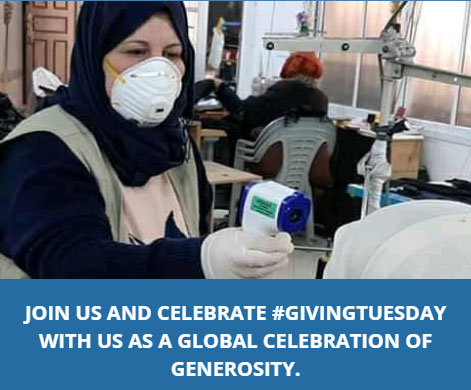
Dec 1, 2020
When the pandemic hit, the Solidarity Center quickly pivoted its programming, drawing on its extensive network in more than 60 countries to rapidly respond to the unprecedented COVID-19 crisis.
- In Kenya, Solidarity Center joined with the Central Organization of Trade Unions (COTU-K) to protect market vendors and reduce community spread of COVID-19 by providing infection control supplies for distribution through worker organizations representing nearly 6,000 informal workers.
- With the Kuwait Trade Union Federation (KTUF), the Solidarity Center connected with migrant worker associations to distribute 100,000 COVID-19 information brochures to 3 million migrant workers in Bengali, French, Hindi, Sinhala Tagalog and addressed unpaid wages and unsafe living arrangements by working with the government officials to solve urgent issues.
- Partners in the Solidarity Center Workers Empowerment and Participation program in Bangladesh distributed 30,000 COVID-19 awareness leaflets to community members and helped reduce rent for garment workers laid off due to COVID-19.
“Whether we were creating innovative organizing ideas or rapidly mobilizing resources for local campaigns and for the sheer survival of unions during this crucial period, we stood strong by our commitment to protect workers and their rights worldwide and strengthen solidarity with our union partners during this time of crushing layoffs and economic devastation,” says Solidarity Center Executive Director Shawna Bader-Blau.
Today, #GivingTuesday, the Solidarity Center is raising $25,000 to support grassroots programs worldwide.
Will you join us to go above and beyond in order to meet this goal? Any gift you make, regardless of the amount, will make a difference through our work.
#GivingTuesday is a day to stand up for what you believe in. It is a day to stand in solidarity with workers and the Solidarity Center’s more than 500 unions and worker rights partners around the world. It’s a day to demonstrate that you care.
“Resilience is part of who we are and always have been,” says Bader-Blau. “Our union partners and workers worldwide have faced unimaginable hardships but have demonstrated perseverance and innovation in many new ways. And we are standing right there with them.”
Donate now!
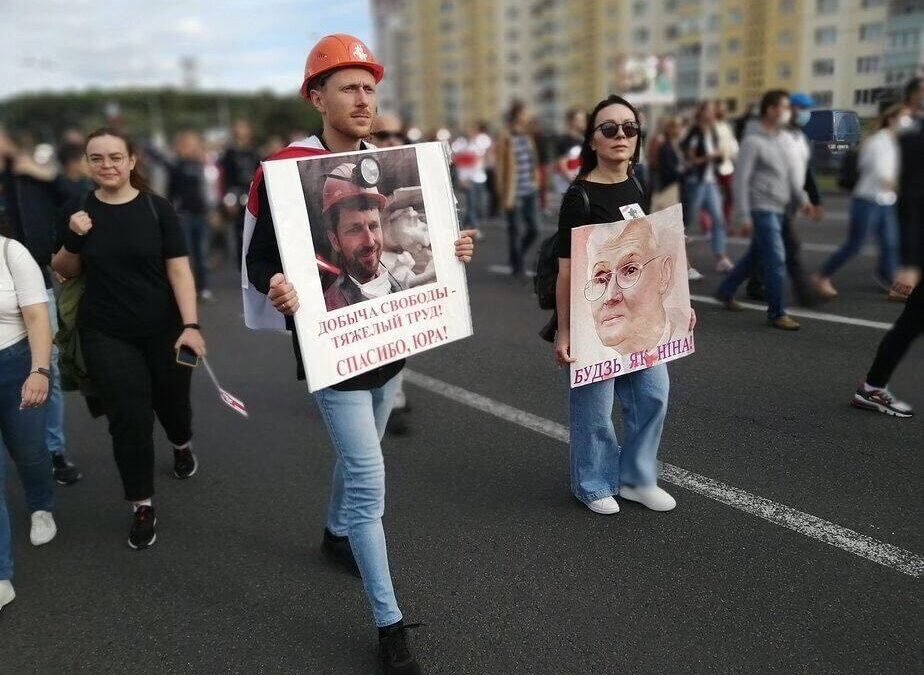
Oct 30, 2020
A vicious crackdown in Belarus on striking workers peacefully protesting President Lukashenko’s refusal to leave power despite months-long popular protests is drawing the attention and condemnation of worker and human rights experts, including Amnesty International, the AFL-CIO, the Solidarity Center and the International Trade Union Confederation (ITUC).
“The right to strike is guaranteed under international law, and the government is obliged to respect this right, all the more because Belarus has ratified ILO Conventions 87 and 98,” says ITUC General Secretary Sharan Burrow, who also denounced Belarus’s violation of workers’ fundamental right to freedom of assembly and of association rights through police violence and threats targeting the general public.
Lukashenko, in power since 1994, claims to have won the August 9 presidential election by a landslide, even though his political opponents and citizens charge poll-rigging. The country’s almost daily protests since then have incurred an authoritarian response that, so far, has led to several deaths, hundreds of injuries and more than 10,000 arrests.
In Minsk, where 100,000 people marched to deliver a “People’s Ultimatum,” authorities cut off mobile internet access, closed down public transportation, turned out balaclava-clad riot police and military and riot control vehicles at strategic sites, and attacked protesters in the evening.
Participants in Monday’s general strike, including ITUC affiliate the Belarusian Congress of Democratic Trade Unions (BKDP), demanded Lukashenko’s resignation, a halt to the crackdown and the release of political prisoners. Thousands stayed home or took to the streets—including workers at state-owned factories and private enterprises, including restaurants and cafes—as well as university students and their teachers. At least 155 people were arrested for supporting the strike in Minsk, Borisov, Brest, Grodno, Mogilev and Novopolotsk, human rights group Vesna reported.
Intimidation may have had a chilling factor on the strike, says the BKDP, who also reported that peacefully protesting workers at Minsk’s Hi-Technology Park were being intimidated and dispersed. Other intimidation tactics included visits by security officers to the homes of workers who failed to start their shift at Grodno Azot, a major nitrogen fertilizer producer in Grodno, as reported by the Associated Press.
“A frank disregard is being shown for the most basic of human rights, and the right to strike is now one more that is being mercilessly crushed,” says Amnesty International Acting Director for Eastern Europe and Central Asia Denis Krivosheev.
The AFL-CIO, in a letter to the BKDP president, praised the BKDP, its affiliates and members for their support for worker rights and democracy despite government repression and harassment.
“Intimidation must end. We support the right of workers to participate in collective actions specifically to demand fair and democratic elections,” says Solidarity Center Europe and Central Asia Director Rudy Porter.
The ITUC Global Rights Index, has ranked Belarus “no guarantee of rights” for many years under Lukashenko’s government, including in 2020, in part because legal strikes are effectively impossible while illegal strikes fall afoul of severely punitive legislation.
Update: Read the BKDP’s November 2 statement regarding the punishment of striking workers and their leaders, in Russian.





